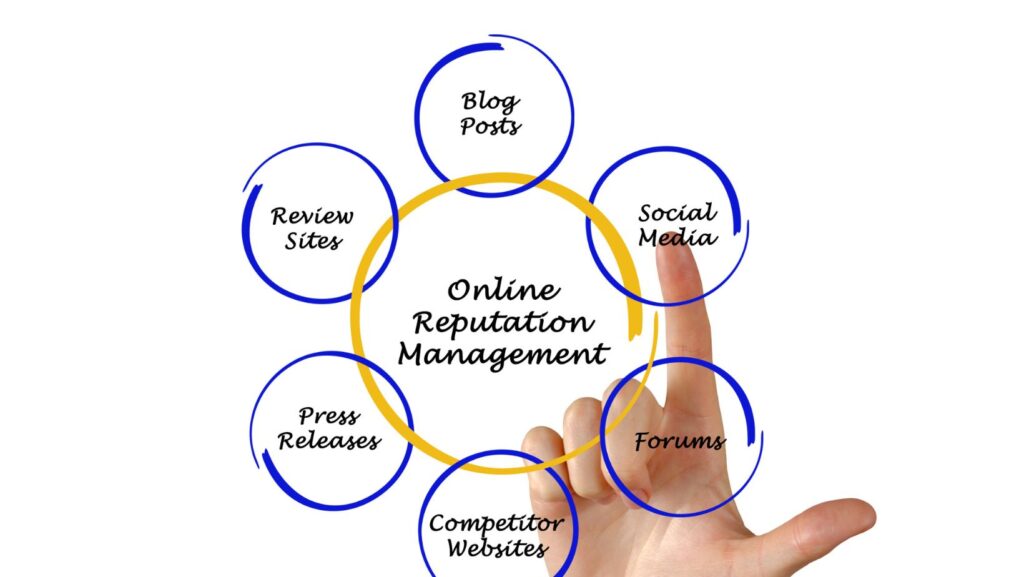Online Reputation Management: Master Your Digital Image

Online Reputation Management (ORM) has evolved into a critical component of any company’s strategy.
ORM is the activity of developing tactics to change or affect public perception of a company, individual, or other entity on the Internet.
It influences public perception of a company and its products or services.
ORM is becoming increasingly important as people rely on online information to make shopping decisions.
The online reputation of a company can be its most valuable asset or its greatest liability.
A strong, favorable internet reputation can help a company expand, acquire new clients, and differentiate itself from its competitors.
Understanding Online Reputation Management

Collective internet reviews, comments, and debates about a firm often shape an online reputation. These can happen on a variety of venues, such as social media, review sites, and the company’s own website.
These interactions and perceptions combine to establish a company’s online reputation. It is critical for effective ORM to understand the dynamics of these platforms and how information spreads on them.
ORM relies heavily on online customer ratings and comments. They offer a direct channel to client opinions and experiences, providing vital information about what a company does well and where it might improve.
Positive reviews can enhance a company’s reputation, but negative reviews might harm it. As a result, managing these reviews, appreciating positive comments, and constructively responding to criticism are critical to successful ORM.
Social media has become an extremely powerful component in a company’s online reputation. It’s where customers can express themselves, discuss their experiences, and interact with businesses directly.
A well-managed social media presence can assist a company’s reputation by demonstrating its responsiveness and dedication to customer satisfaction.
The significance of search engine results in terms of online reputation cannot be emphasized. When potential customers conduct an online search for a company, the results they receive have a big impact on their perception of that firm.
Negative articles, negative reviews, or unpleasant information can all affect a company’s reputation.
As a result, businesses must endeavor to ensure that the top search results for their products and services are favorable and accurate.
Strategies for Effective Online Reputation Management

Monitoring and assessing your internet presence on a regular basis is critical for understanding how your company is perceived online.
Google Alerts might be a good tool for this, as it will notify you whenever your company is referenced online.
Consider employing specific ORM tools that can detect mentions across many platforms and inform you about potential concerns before they escalate.
Dedicated ORM Tools
- Brand24: This tool provides real-time monitoring of mentions across the web, including social media, blogs, forums, and more. It also offers sentiment analysis to help understand the tone of the conversations about your brand.
- Reputation.com: This platform offers a suite of tools for review management, social media monitoring, surveys, business listings, and operational insights. It’s particularly popular among businesses with multiple locations.
- ReviewTrackers: This tool focuses on tracking online reviews from over 100 review sites. It provides real-time updates and also offers sentiment analysis and trend reports.
- BirdEye: BirdEye offers a comprehensive platform for review monitoring, review generation, and review marketing. It also includes features for surveys, ticketing, and listings management.
- Hootsuite: While primarily a social media management tool, Hootsuite also includes features that can help with ORM, such as social media monitoring and analytics.
- Yext: Yext is designed to manage online listings, which can play a big role in ORM. It ensures your business information is consistent across various platforms, which can improve SEO and overall online presence.
- Awario: This tool offers web and social listening features, allowing you to track mentions of your brand in real time. It also provides sentiment analysis and competitive analysis features.
- Podium: Podium is an interaction management tool that helps local businesses manage their online reviews, communications, and client feedback.
The appropriate tool for your company is determined by your unique requirements, budget, and the platforms where your consumers are most engaged. Use free samples or demonstrations to determine which tool is ideal for your company.
Positive reviews can drastically improve your internet reputation.
This can be accomplished by delivering exceptional customer service and then gently requesting that satisfied customers submit a review.
Responding to these evaluations, especially the favorable ones, might help to build your reputation even more. It demonstrates that you value your customers’ input and are committed to maintaining good service standards.
It is also critical to respond correctly to unfavorable feedback.
Responding to unfavorable reviews swiftly and properly can transform a potentially devastating situation into an opportunity for improvement and customer engagement. It is also critical to put these suggestions into action.
This demonstrates your dedication to client satisfaction and constant improvement, which can significantly improve your online reputation.
Creating a positive brand image is critical to ORM success.
This can be accomplished through smart content marketing that positions your company as an industry authority.
A well-designed, user-friendly website can also considerably improve the image of your brand. It not only helps you attract and retain consumers, but it also demonstrates your professionalism and dedication to quality.
ORM relies heavily on social media management.
Actively engaging with clients, answering their questions, and immediately resolving their complaints can improve your online reputation.
It demonstrates that you care about your consumers and are dedicated to giving outstanding service.
Another significant part of ORM is search engine optimization (SEO).
Effective SEO methods can aid in the improvement of your search engine rating, ensuring that positive and truthful information about your company appears first in search results.
This can dramatically improve your internet reputation by positively impacting public perception.
Case Studies of Successful Online Reputation Management

Case studies of businesses that have successfully managed their internet reputations can teach others a great deal.
Businesses who have managed a crisis successfully, responded quickly and professionally to poor reviews, or used customer input to enhance their products or services, for example, illustrate how effective ORM may result in positive consequences.
These case studies demonstrate the effectiveness of strategic ORM.
Lessons from these case studies can be applied broadly.
They frequently emphasize the need for transparency, prompt response times, and a readiness to make required adjustments in response to customer input.
Businesses can learn how to manage various situations, avoid common traps, and capitalize on opportunities to improve their online reputation by analyzing these cases.
Case Study: JetBlue Airways
JetBlue Airways is a well-known example of a company that has successfully managed its online reputation.
In 2007, the airline faced a major issue when an ice storm grounded many of their flights, resulting in stranded passengers and an influx of negative news.
JetBlue Airways’ Online Reputation Management
Recognition of the Issue: JetBlue was fast to detect the problem and accept their error. David Neeleman, the CEO at the time, publicly apologized and detailed the issues that led to the disaster.
JetBlue used their website and email to connect directly with customers, explaining what had happened, what they were doing to remedy it, and how they planned to avoid similar problems in the future. This open and honest communication helps to restore client trust.
JetBlue introduced a Customer Bill of Rights in reaction to the crisis, outlining what passengers may expect in terms of compensation for different inconveniences, such as delayed or cancelled flights. This was a clear move toward guaranteeing that such an incident would not happen again, and it was highly appreciated by customers.
Real-Time Updates via social media: JetBlue also used social media channels to keep passengers up to date in real-time. They replied quickly to consumer complaints and inquiries, demonstrating their dedication to customer service.
Long-Term Operations Changes: JetBlue altered its operating approach to avoid similar problems in the future. This included investing in new technologies to manage extreme weather and peak traffic times more effectively.
As a result of their efforts, their online reputation improved.
The incident received a lot of negative attention at first, but JetBlue’s response helped to turn the situation around.
Their prompt admission of the problem, open communication, and specific efforts to prevent future problems demonstrated to clients that they were committed to their satisfaction, recovering their reputation.
Common Mistakes in Online Reputation Management and How to Avoid Them

Ignoring unfavorable reviews or comments is one of the most typical ORM mistakes. Businesses may do this to avoid calling attention to unfavorable feedback.
Doing so can have a negative impact on a company’s reputation eventually. Businesses should instead respond to negative criticism quickly and professionally, demonstrating that they respect all feedback and are committed to correcting any concerns.
Another typical error is insufficient communication with customers. Businesses may fail to engage with customers on a regular basis or communicate clearly. This might cause misconceptions and harm a company’s reputation.
To avoid this, businesses should maintain clear, consistent contact with their consumers, informing them of any changes, updates, or difficulties that may affect them.
Another issue in ORM is a lack of transparency.
Businesses may try to conceal unfavorable situations or avoid admitting mistakes, which can harm their reputation when the truth is revealed.
Organizations should strive for transparency, freely admitting mistakes when they occur, honestly apologizing, and laying out plans to avoid similar situations in the future.
Online Reputation Management Future Trends

The future role of AI and Machine Learning in ORM is predicted to rise. These technologies can assist organizations in better monitoring their online reputation, identifying patterns in customer feedback, and responding to issues more swiftly.
This can assist firms in staying ahead of the curve and managing their internet reputation in a proactive manner.
Here’s an example of how it might be used:
Sentiment Analysis Powered by AI
Sentiment analysis is one of the primary areas where AI may assist in ORM. The technique of determining whether a piece of writing is favorable, negative, or neutral is known as sentiment analysis, sometimes known as opinion mining.
The number of online feedback (such reviews, comments, and social media posts) that businesses receive on a daily basis, manually analyzing each one to identify the underlying emotion is nearly impossible.
This procedure can be automated using AI, notably machine learning algorithms can swiftly and accurately analyze enormous amounts of text data, recognizing the sentiment underlying client feedback.
This can assist firms in understanding how their customers feel about their brand, product, or service on a large scale.
An artificial intelligence-powered technology can scan hundreds of web reviews and categorize them as good, negative, or neutral.
Within the input, it can even pinpoint specific concerns or themes.
If a large number of unfavorable reviews indicate poor customer service, the AI tool can emphasize this, allowing the company to immediately discover and address this issue.
AI can perform sentiment analysis in real time.
This implies that firms may monitor changes in sentiment as they occur, allowing them to respond promptly to any difficulties (such as an unexpected rush of negative feedback) and potentially avoid a full-blown reputation crisis.
AI-powered chatbots for better customer service, predictive analytics to foresee reputation-impacting events, and picture recognition software to monitor visual information linked with the business are among the other applications.
Another issue to keep an eye on is the impact of privacy laws and regulations on ORM. Businesses will need to alter their ORM strategy as data privacy issues grow and harsher rules are enacted.
This could involve more transparent data processing techniques as well as a greater regard for client privacy.
Customer expectations are also likely to influence ORM.
Customers today want firms to respond quickly, provide individualized service, and be transparent. Meeting these expectations will be critical in the future for keeping a strong internet reputation.
Final Thoughts

The significance of successful ORM and its tactics cannot be emphasized.
There are various actions businesses can take to effectively manage their online reputation, ranging from monitoring their online presence and encouraging favorable reviews to dealing with bad criticism and developing a positive brand image.
Businesses of all sizes should invest in ORM as we move farther into the digital world.
It is not only about dealing with negative criticism or crises; it is also about developing a strong, positive online presence that may fuel corporate growth and success.
ORM’s future is anticipated to include increased use of technology, stronger privacy restrictions, and shifting customer expectations.
Businesses who can adjust to these developments while maintaining a focus on ORM will be well-positioned to thrive in the digital age.
FAQ
Q:What is Online Reputation Management (ORM)?
A: ORM is the activity of developing tactics to change or affect public perception of a company, individual, or other entity on the Internet. It influences public perception of a company and its products or services.
Q: Why is ORM important for my business?
A: Consumers increasingly rely on online information to make purchasing decisions. Your business’s online reputation can be its strongest asset or its biggest liability. A solid, positive online reputation can help a business grow, attract new customers, and stand out from the competition.
Q: What are some dedicated ORM tools I can use?
A: Some ORM tools include Brand24, Reputation.com, ReviewTrackers, BirdEye, Hootsuite, Yext, Awario, and Podium. These tools offer various features such as real-time monitoring of mentions, review management, sentiment analysis, and more.
Q: How should I manage negative reviews?
A: Respond promptly and professionally to negative reviews. This can turn a potentially damaging situation into an opportunity for improvement and customer engagement. It’s crucial to implement changes based on this feedback, showing your commitment to customer satisfaction and continuous improvement.
Q: What role does social media play in ORM?
A: Social media is an influential factor in a business’s online reputation. It’s where customers voice their opinions, share their experiences, and engage directly with businesses. A well-managed social media presence can help enhance a company’s reputation by displaying its responsiveness and commitment to customer satisfaction.
Q: How can AI help with ORM?
A: AI can be used in ORM for tasks such as sentiment analysis. AI can analyze large amounts of text data quickly and accurately, identifying the sentiment behind customer feedback. This can help businesses understand how customers are feeling about their brand, product, or service on a scale.
Q: What are some future trends in ORM?
A: The role of AI and Machine Learning in ORM is expected to grow. The impact of privacy laws and regulations on ORM is another trend to watch. With increasing concerns about data privacy and stricter laws, businesses will need to adapt their ORM strategies. Evolving customer expectations are also likely to affect ORM.
Q: What are some common mistakes in ORM?
A: Common mistakes include ignoring negative reviews, inadequate communication with customers, and lack of transparency. These can all damage a business’s reputation and should be avoided by responding to feedback promptly and professionally, ensuring clear and consistent communication, and being transparent with customers.
Q: What can we learn from ORM case studies?
A: Case studies, like that of JetBlue Airways, can show us how effective ORM can result in positive outcomes. They often highlight the importance of transparency, quick response times, and the willingness to make necessary changes based on customer feedback.
Bio

Ronnie Patterson
Ronnie Patterson, founder of MagnÜron, is a multifaceted entrepreneur with a diverse background in music, electronics engineering, and engineering management. Drawing on experience across various industries, He offers expertise in SEO, operations, and strategy to help businesses thrive. Possessing a unique perspective and unwavering commitment to collaboration, and ideal partner for growth and success.





